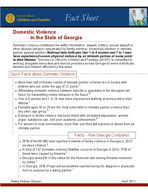Fact Sheet
- - - - - - - - - - - - - - - - - - - - - - - - - - - - - - - - -
Domestic Violence in the State of Georgia
Domestic violence constitutes the willful intimidation, assault, battery, sexual assault or other abusive behavior perpetrated by family member, household member or intimate partner against another. National data indicates that 1 in 4 women and 1 in 7 men have experienced severe physical violence by an intimate partner at some point in their lifetime.1 Governor's Office for Children and Families (GOCF) is committed to working alongside advocates and service providers across Georgia to serve individuals, families and children affected by this issue.
Quick Facts about Domestic Violence - - - - - - - - - - - - - - - - - - - - - - - - - - - - - - - - - - - - - - - -
More than half of female victims of intimate partner violence live in homes with children who are under the age of 12 years.2 Witnessing domestic violence between parents or guardians is the strongest risk factor for transmitting violent behavior in the future.4 One in 6 women and 1 in 19 men have experienced stalking at some point in their lifetime.1 Females ages 16 to 24 are the most vulnerable to intimate partner violence than any other age group.3 Exposure to family violence has been linked with increased depression, anxiety, anger, substance use, and poor academic achievement.5 For women in rural communities, more than one-third will experience abuse from an intimate partner.
Facts - How Georgia Compares
35% of the 65,485 total reported incidents of family violence in Georgia in 2010 involved children.3 A total of 132 domestic violence fatalities occurred in Georgia in 2010; 75% of these were caused by firearms.7 Georgia ranks 6th in the nation for the homicide rate among females murdered by males.7 In Georgia, 16% of high school students reported being hit, slapped or physically hurt on purpose by a dating partner.1
Family Violence Division
April 2012
How to Get Help
- - - - - - - - - - - - - - - - - - - - - - - - - - - - - - - - - - - - - - - - - - - - - - - - - - - - - - - - - - - - - - - - - - - - - - - - - - - - - - - - - - - - - - - - -
Georgia Statistics
During fiscal year 2011, the following services were provided by the 46 Certified Domestic Violence Agencies in the state:
73,730 crisis hotline calls answered
7,630 new victims were provided shelter (3,835 children and 3,795 adults) 42,184 new non-residential clients served (16,449 children and 25,735 adults) 7,364 ongoing clients served (2,467 children and 4,897 adults) 5,004 domestic violence support groups
1,818 parenting education/support groups to 5,591 participants 3,718 community presentations to 140,433 participants 149,706 volunteer hours from 3,139 citizens
Violence Against Women: A Lifespan Perspective
GOCF's white paper, Violence Against Women: A Lifespan Perspective, provides an overview of how violence against women is perpetuated across the lifespan and presents perspectives from the literature on effective and appropriate approaches for responding to it. Each section presents the types of physical and sexual violence experienced by girls and adolescents, as well as by college-aged, adult and elderly women and includes discussions of the prevention and intervention approaches specific to each stage of life. To read the white paper, please visit GOCF's Family Violence page on its website at www.children.georgia.gov.
Abuse is never okay. If you or someone you know is involved in an abusive relationship, there are resources available that can assist you in staying safe. Here are some important tips that you can use:
Contact your local domestic violence shelter through Georgia's Family Violence Hotline at 1-800-33-HAVEN (4-2836). Contact the National Domestic Violence Hotline at 1-800-799-SAFE (7233). You can also contact the National Sexual Assault Hotline at 1-800-656-HOPE (4673). To get more information on teen dating violence, or to seek services, contact the National Teen Dating Abuse Helpline at 1-866-331-9474. Talk with people you trust and don't be afraid to seek help.
References: 1. Black, M.C., Basile, K.C., Breiding, M.J., Smith, S.G., Walters, M.L., Merrick, M.T., Chen, J., & Stevens, M.R. (2011). The National Intimate Partner and Sexual Violence Survey (NISVS): 2010 Summary Report. Atlanta, GA: National Center for Injury Prevention and Control, Centers for Disease Control and Prevention. 2.Tjaden P, Thoennes N. Full Report of the Prevalence, Incidence, and Consequences of Violence Against Women: Findings from the National Violence Against Women Survey. In: National Institute of Justice, ed. Washington, D.C.; 2000. 3.Georgia Department of Human Resources. DOMESTIC VIOLENCE IN GEORGIA. In. Georgia: Georgia Department of Human Resources; 2008. 4.Karjane HM, Fisher BS, Cullen FT. Sexual Assault on Campus: What Colleges and Universities Are Doing About It. In: National Institute of Justice, ed. Washington, D.C.; 2005. 5.Wolak J, Finkelhor D. Children Exposed to Partner Violence. In: Jasinski J, Williams L, eds. Partner Violence: A Comprehensive Review of 20 Years of Research. Thousand Oaks, CA: Sage Publications, Inc.; 1998. 6.Herrenkohl T, Sousa C, Tajima E, Herrenkohl R, Moylan C. Intersection of Child Abuse and Children's Exposure to Domestic Violence. Trauma Violence Abuse 2008;9(2):84-99. 7. Georgia Commission on Family Violence & Georgia Coalition on Domestic Violence (2011). 2011 Georgia Domestic Violence Fatality Review Annual Report . Atlanta, Georgia.
- - - - - - - - - - - - - - - - - - - -
